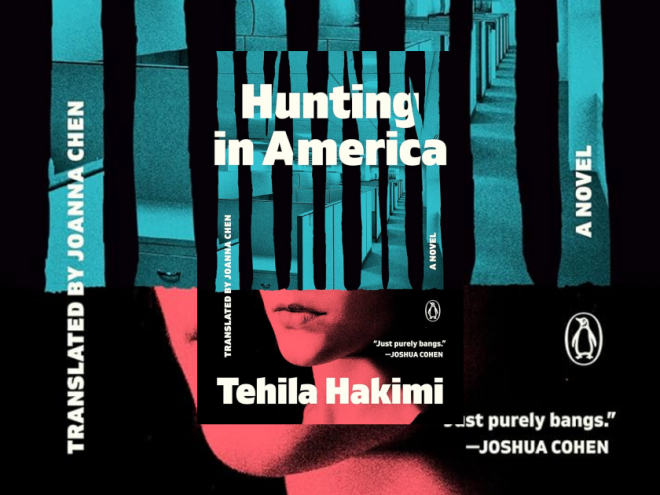Hunting in America, Tehila Hakimi’s debut novel, is a haunting story about a woman attempting to escape her past and create a new identity. With restrained and beautiful prose, Hakimi spins an intoxicatingly strange tale about an Israeli woman relocating to America, learning to hunt, and possibly losing her grasp on reality.
Originally published in Hebrew, Hunting in America won the Jewish Book Council’s 2023 Paper Brigade Award for New Israeli Fiction. In addition to being a novelist, Hakimi is an accomplished poet, which is evident in her mastery of imagery. The novel will be accessible to more readers thanks to Joanna Chen’s expert translation into English.
The plot of Hunting in America is deceptively simple: An unnamed protagonist agrees to work on assignment for the American division of an Israeli company and goes on a series of hunting trips.
Throughout the novel, the reader is given access to only one voice and perspective, that of the protagonist. Nevertheless, through her careful storytelling, Hakimi deftly weaves in complex themes of alienation, perspective, desire, disconnection, and the normalization of violence.
Early in the novel, the reader surmises that the protagonist’s initial goals are assimilating into US culture and succeeding in a male-dominated corporate world. Page-by-page, Hakimi meticulously depicts both the protagonist’s attempts to find her place at work and her increasing obsession with hunting deer. The protagonist also entangles herself in an affair with David, an older, married work colleague who acts as her hunting guide.
Hakimi’s use of setting is particularly interesting. Throughout the novel, the author seamlessly juxtaposes the sterile office, where the protagonist feels increasingly vulnerable, with the world outside, where the protagonist hunts her prey. Neither physical environment is consistently welcoming, but the protagonist’s power is different depending on whether she’s inside or out, and whether she’s carrying a rifle or not. In addition, Hakimi evocatively depicts the other places in the protagonist’s new life, including an IKEA store where she finds unexpected comfort.
Hakimi’s first-person narration creates ambiguity about the protagonist’s motives and true feelings. With each scene, readers can’t help but notice not only what the protagonist reveals, but also the information she leaves out. Hakimi doesn’t create a hefty backstory for the protagonist, but there are enough details for readers to quickly learn that she’s attempting to escape disappointments from her former life in Israel.
As the novel progresses, Hakimi sparingly slips in additional and sometimes alarming details about the protagonist’s past and current desires, along with David’s own complicated back story. With each page, the tension between David and the protagonist builds, as does the concern the reader has for the protagonist’s mental stability. Each time the narrator grabs her rifle, Hakimi skillfully narrows the novel’s focus and increases the suspense, all the way to the end.
Anna Stolley Persky, a journalist and lawyer by background, writes fiction and creative nonfiction. She’s been published in The Washington Post, Mystery Tribune, Ellery Queen, and Pithead Chapel.




